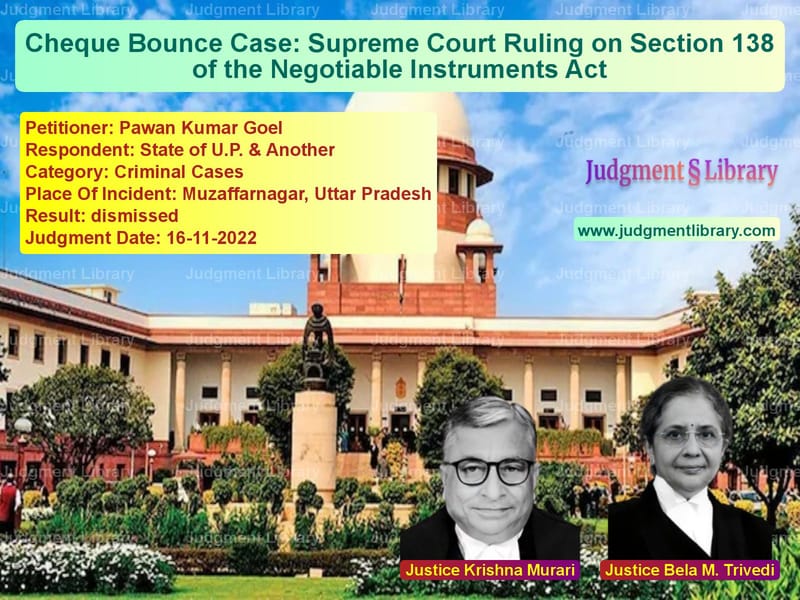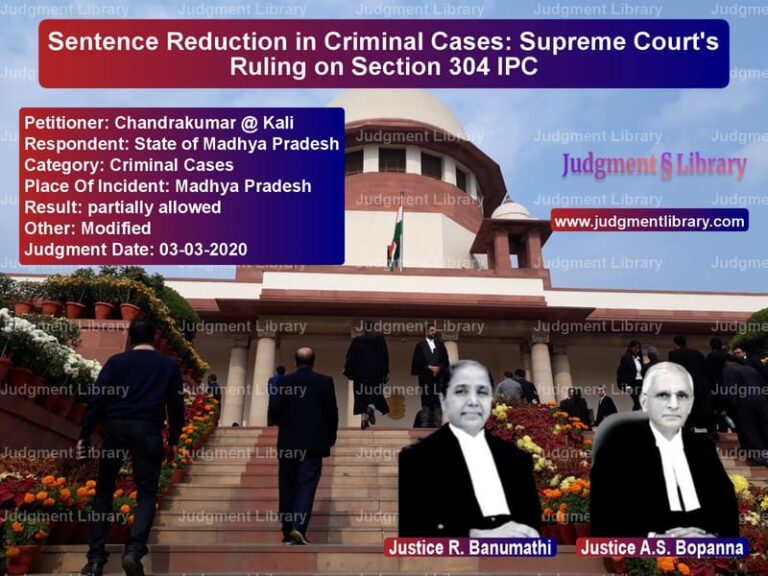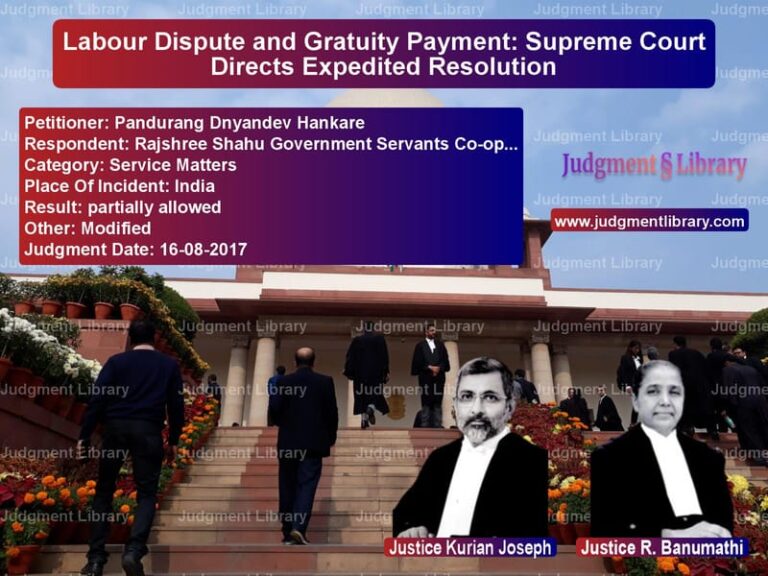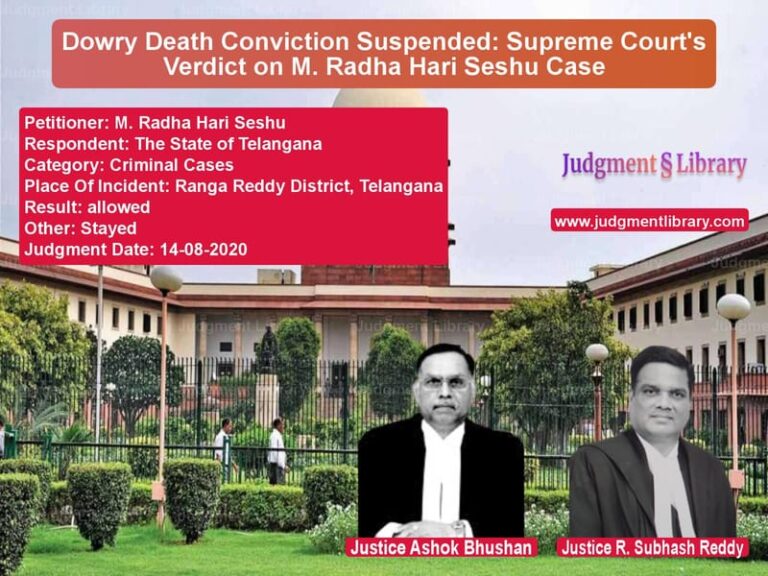Cheque Bounce Case: Supreme Court Ruling on Section 138 of the Negotiable Instruments Act
The case of Pawan Kumar Goel vs. State of U.P. & Another addresses an important legal issue concerning the dishonor of a cheque under Section 138 of the Negotiable Instruments Act, 1881 (NI Act). The Supreme Court was tasked with determining whether a complaint under Section 138 could be maintained against a director of a company without the company itself being named as an accused. The case is significant for clarifying the requirements for prosecution in cheque bounce cases involving corporate entities.
Background of the Case
The appellant, Pawan Kumar Goel, was engaged in the business of sales of machinery and spare parts under the name ‘M/s Pawan Hardware Store.’ The respondent, Ravi Organics Limited, was a private limited company dealing in chemicals. Both parties had a long-standing business relationship, and Ravi Organics Limited had a running account with the appellant.
The dispute arose when the respondent issued an account payee cheque for Rs. 10 lakhs in favor of the appellant, which was subsequently dishonored on 24.12.2012. Following this, the appellant sent a legal notice on 01.01.2013, demanding payment. Despite service of the notice, the respondent failed to make the payment, leading to the filing of four criminal complaints under Section 138 of the NI Act.
Legal Issues Raised
- Whether a complaint under Section 138 can be maintained against a director of a company without the company itself being named as an accused.
- Whether the summoning order against the director, passed by the Magistrate, was valid.
- Whether the High Court erred in quashing the complaint and summoning order.
- Whether an amendment to the complaint to include the company as an accused is permissible at a later stage.
Arguments by the Petitioner (Pawan Kumar Goel)
The appellant contended:
- The cheque was issued towards the discharge of a legitimate debt, and its dishonor made the respondent liable under Section 138 of the NI Act.
- The complaint, though mistakenly not naming the company as an accused, provided sufficient details about its involvement.
- The High Court exceeded its jurisdiction in quashing the complaint without properly examining the allegations.
- The absence of the company as an accused was a curable defect and should not have led to the dismissal of the complaint.
- The principles of vicarious liability under Section 141 of the NI Act should apply to hold the director responsible.
Arguments by the Respondent (State of U.P. & Ravi Organics Ltd.)
The respondents countered:
- Under Section 141 of the NI Act, if a cheque is issued by a company, the company itself must be arraigned as an accused before any director can be prosecuted.
- The complaint failed to mention that the accused director was in charge of and responsible for the conduct of the company’s business.
- The absence of specific averments in the complaint about the director’s role rendered the complaint legally unsustainable.
- The High Court rightly quashed the complaint, as it did not meet the essential requirements laid down by the Supreme Court in Aneeta Hada vs. Godfather Travels & Tours Pvt. Ltd. and S.M.S. Pharmaceuticals Ltd. vs. Neeta Bhalla.
Supreme Court’s Observations
The Supreme Court made several key observations:
“The company, being a juristic entity, is the principal offender in cheque bounce cases. Unless the company is named as an accused, its directors cannot be held vicariously liable.”
The Court further noted:
“Section 141 of the NI Act requires specific averments in the complaint that the accused director was responsible for the conduct of the company’s business at the time of the offence.”
Judgment Outcome
The Supreme Court upheld the High Court’s decision and dismissed the appeals, ruling:
- The complaint was defective as it failed to name the company as an accused.
- There was no provision under the NI Act allowing for the amendment of a complaint to include a company at a later stage.
- Vicarious liability under Section 141 could not be imposed on the director in the absence of the company’s prosecution.
- The High Court correctly quashed the complaint and summoning order.
Key Takeaways from the Judgment
- The Supreme Court reaffirmed the principle that a company must be named as an accused in cheque bounce cases involving corporate entities.
- Directors cannot be held vicariously liable unless there are clear averments in the complaint about their role in the company’s business.
- Courts must ensure compliance with Section 141 before taking cognizance of complaints under Section 138.
- The ruling provides clarity on procedural requirements in cheque dishonor cases involving corporate entities.
Conclusion
The Supreme Court’s ruling reinforces the importance of procedural compliance in cheque bounce cases under the NI Act. The judgment ensures that directors are not unfairly prosecuted without clear allegations regarding their role. This case sets a precedent for future disputes involving corporate entities and cheque dishonor matters.
Petitioner Name: Pawan Kumar Goel.Respondent Name: State of U.P. & Another.Judgment By: Justice Krishna Murari, Justice Bela M. Trivedi.Place Of Incident: Muzaffarnagar, Uttar Pradesh.Judgment Date: 16-11-2022.
Don’t miss out on the full details! Download the complete judgment in PDF format below and gain valuable insights instantly!
Download Judgment: pawan-kumar-goel-vs-state-of-u.p.-&-anot-supreme-court-of-india-judgment-dated-16-11-2022.pdf
Directly Download Judgment: Directly download this Judgment
See all petitions in Fraud and Forgery
See all petitions in Bail and Anticipatory Bail
See all petitions in Judgment by Krishna Murari
See all petitions in Judgment by Bela M. Trivedi
See all petitions in dismissed
See all petitions in supreme court of India judgments November 2022
See all petitions in 2022 judgments
See all posts in Criminal Cases Category
See all allowed petitions in Criminal Cases Category
See all Dismissed petitions in Criminal Cases Category
See all partially allowed petitions in Criminal Cases Category







